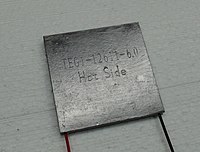
Photo from wikipedia
Abstract Electric clothes dryers consume about 6% of US residential electricity consumption. Using a solid-state technology without refrigerant, thermoelectric (TE) heat pump dryers have the potential to be more efficient… Click to show full abstract
Abstract Electric clothes dryers consume about 6% of US residential electricity consumption. Using a solid-state technology without refrigerant, thermoelectric (TE) heat pump dryers have the potential to be more efficient than units based on electric resistance and less expensive than units based on vapor compression. This paper presents a steady state TE dryer model, and validates the model against results from an experimental prototype. The system model is composed of a TE heat pump element model coupled with a psychrometric dryer sub-model. Experimental results had energy factors (EFs) of up to 2.95 kg of dry cloth per kWh (6.51 lbc/kWh), with a dry time of 159 min. A faster dry time of 96 min was also achieved at an EF of 2.54 kgc/kWh (5.60 lbc/kWh). The model was able to replicate the experimental results within 5% of EF and 5% of dry time values. The results are used to identify important parameters that affect dryer performance, such as relative humidity of air leaving the drum.
Journal Title: Applied Energy
Year Published: 2018
Link to full text (if available)
Share on Social Media: Sign Up to like & get
recommendations!